| Delphi Clinic | C++Builder Gate | Training & Consultancy | Delphi Notes Weblog | Dr.Bob's Webshop |
| Delphi Clinic | C++Builder Gate | Training & Consultancy | Delphi Notes Weblog | Dr.Bob's Webshop |
| ||||||
CORBA is not an easy topic. In fact, it often takes considerable effort and expertise to truly master CORBA development issues. Fortunately, there are a great number of books to help us learn the basics, master the details or get an in-depth understanding of this Common Object Request Broker Architecture.
To start with the basics; if you've got no prior understanding of CORBA whatsoever, and you want to learn it from the ground up, there are two books you can read. Both CORBA for Dummies and Teach Yourself CORBA in 14 Days are ideal to start your exploration of CORBA from a C++ or Java background. And make no mistakes: even if you know where to click inside Delphi to produce a CORBA Client or Server, that doesn't necessarily mean you know CORBA (you only know the steps that are provided to you by Delphi). A big number of the current Delphi programmers will fit into that category, and for them one of these two books might help to understand what's going on behind the scenes of CORBA.
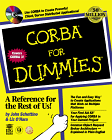 CORBA for Dummies (IDG Books)
CORBA for Dummies (IDG Books)
CORBA for Dummies is a small, easy to read, fun, yet very helpful book that uses C++ and Java to illustrate development of both small and larger CORBA-based applications.
The authors clearly know what they're writing about, and they kept the book limited to just what you need to get started with CORBA.
You'll get hands-on experience from the start building clients and servers, in both C++ and Java.
The book also covers CORBA 3.
The book includes a CD-ROM with a evaluation copies of Iona's Orbix for C++ and Orbix Web Pro for Java, as well as Inprise's VisiBroker for C++ and VisiBroker for Java (of course, if you have the Client/Server or Enterprise editions of Delphi, C++Builder or JBuilder, then you have the full version of the VisiBroker already).
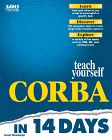 Teach Yourself CORBA in 14 Days (SAMS)
Teach Yourself CORBA in 14 Days (SAMS)Teach Yourself CORBA in 14 Days is the book that I used to set my first steps in the CORBA world (thanks again, Joanna). Apart from practical examples, it also contains a somewhat more theoretical background on CORBA, IDL and ORBs. The format is consistent with the two-week tutorial, including questions and answers after each day. The author uses C++ and Java throughout the book, which turns from simple to a rather complex CORBA banking application.
Both books are great introductions into CORBA, but they require knowledge of Java or C++ (and, as a consequence, all examples are using Java or C++ only). For a good Delphi 4 book that covers CORBA, I can of course recommend Delphi 4 Unleashed by Charlie Calvert, which contains one chapter dedicated to CORBA by itself (60 pages) and another one showing how to use Delphi, C++ and Java together based on CORBA as well (another 40 pages). You don't get the background information found in the previous two books, but for real Delphi development, you won't find anything more useful than Delphi 4 Unleashed.
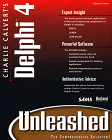 Delphi 4 Unleashed (SAMS)
Delphi 4 Unleashed (SAMS)
After the basics, you get the more advanced books on CORBA. A good follow-up book (and in my view the CORBA-Bible for Java developers) is Client/Server Programming with Java and CORBA. Using Java and the VisiBroker for Java, this book is simply the single best CORBA resource available that I've seen so far. Starting with the basics, the book discusses topics like 2- or 3-tier database query systems with JDBC (pros and cons) and ends with a fully implemented client/server transaction-handling system. You have to have a little sense of humour regarding the "intergallactic web theme" (the little green men on the cover).
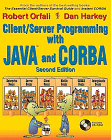 Client/Server Programming with Java and CORBA (Wiley)
Client/Server Programming with Java and CORBA (Wiley)Another good CORBA book is CORBA Programming Unleashed, which covers both Java and C++ again.
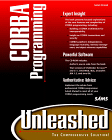 CORBA Programming Unleashed (SAMS)
CORBA Programming Unleashed (SAMS)A relative new book on CORBA and C++ is called Advanced CORBA Programming with C++, and as the name implies: it's about CORBA 3.0 with C++ only (no Java this time).
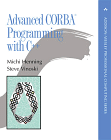 Advanced CORBA Programming with C++ (Addison-Wesley)
Advanced CORBA Programming with C++ (Addison-Wesley)